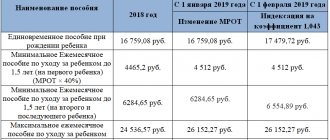The mechanism for the occurrence of alimony obligations
The criteria that contribute to the emergence of alimony obligations for an individual are described in the table below.
| Criteria | Detailed description |
| Presence of family or related connections | This is the main criterion, in the absence of which the interested person has no right to demand alimony. The existence of a connection must be confirmed through the state registry office, for example:
Thus, we can conclude that a biological father who is not listed as a parent on the birth certificate is not required to provide monetary or other assistance to the child. The same applies to cohabitants who do not live in a registered marriage and therefore are not legally obligated to help each other. |
| Additional criteria for various categories of individuals |
|
| Availability of necessary funds | This criterion means that alimony cannot be demanded from every alimony provider, but only from such alimony provider who earns enough so that after fulfilling all obligations to the state and other persons, he will have money left in an amount exceeding the subsistence level. However, this criterion has exceptions: it does not apply to cases of payment of alimony from parents in favor of minors or adult children, as well as to cases of payment of alimony from adult children in favor of parents. |
In what cases does the state pay child support?
State support in the Russian Federation does not provide for the payment of alimony from the budget, but in a number of situations, with the help of the state, it is possible to collect alimony from certain categories of citizens.
Alimony at the expense of the state is received in the form of additional benefits and additional payments, for example, in the event of the loss of a breadwinner, a survivor benefit is paid. It can be obtained if the breadwinner was declared dead or missing (bailiffs were unable to find him after 12 months of operational search activities).
The amount of survivor benefits depends on the type of social pension:
- Insurance - if the breadwinner was officially employed and paid insurance premiums. The amount of payments depends on the salary received by the deceased. (Article 10 of Federal Law No. 400)
- State - if the breadwinner worked for the state, and the death was associated with the performance of his direct duties: military personnel, astronauts, accident liquidators, firefighters, etc. (Article 13 of Federal Law No. 166)
- Social - if the breadwinner was listed in the OPS system, but was not officially employed. (Article 11 Federal Law No. 166 and Article 10 Federal Law No. 400).
Survivor's pension
Basic situations for the payment of alimony by the state
The main thing that people planning to receive government assistance in the form of social alimony for a child or for other needy persons needs to understand is that the state does not provide financial compensation to alimony recipients who have lost monetary support from alimony defaulters. This means that currently, by law, only the obligated person is personally liable for non-payment of alimony.
Before the crisis began in 2014, the Russian government was developing a law that, once adopted, would create an alimony fund. The funds from this fund were planned to be directed to needy alimony recipients in cases where the alimony recipient:
- He was put on the wanted list by bailiffs.
- Had a period of debt to the alimony recipient exceeding 6 months.
- Refused to pay the monthly amount of alimony assigned by the court or by agreement, or to cover the existing debt to the alimony recipient.
- He was in a colony due to a criminal conviction and did not have the opportunity to work in prison.
- He was in the army on compulsory service.
- He was placed in a medical organization for compulsory treatment due to mental illness, alcohol or drug addiction.
- He was declared incompetent.
- Left for another state for permanent residence.
- Couldn't pay due to force majeure, i.e. emergency situations, natural disasters, accidents at power plants, etc.
However, the law was not adopted and, most likely, will not be adopted in the near future, since positive changes in the Russian economy are still unlikely. In this regard, alimony recipients have only 2 options for responding to a situation with non-payment of alimony.
| Options for solving the problem | Legal comment |
| Put pressure on the child support provider | There are several legal ways to force an obligated person to pay alimony. They will be discussed in more detail in the chapter “Legal consequences of evading the payment of alimony.” |
| Try to extract any of the available benefits from the state | The following types of social assistance are currently available:
Having analyzed what was written above, we can conclude that the Russian state is taking some measures to support pregnant women and children under 1.5 years of age. However, in the future it actually abandons these people to their fate. |
Grounds for assigning payment
The mother can receive government support if she meets the requirements (Article 16 No. 81-FZ). In particular, women are entitled to an increased monthly benefit if they are raising children alone. This support is only available to residents of certain regions where the relevant regulations have been adopted.
You can receive alimony only if all of the following conditions are met:
- There is a court decision to collect alimony
- Bailiffs confirmed that the payer does not transfer alimony
- No payment for 6 months
- The alimony payer is wanted
If the location of the alimony debtor is known, but it is not possible to collect alimony, then it can be obtained from the state in a situation where the citizen:
- Is in custody
- Deliberately evades alimony payments, for example, not officially applying for a job
- Moved to another country for permanent residence
- Has a court decision on compulsory referral for treatment
- Declared incompetent
- Compulsory military service
- For reasons beyond his control, he is unable to pay alimony
Features of alimony collection
In all cases, the relationship between the alimony provider and the alimony recipient regarding the collection of alimony can be resolved by concluding an alimony agreement with a notary. This is a convenient and flexible way to independently regulate alimony obligations, in particular, establish the frequency of payments, the duration of the contract and the amount of payments.
Below we will describe the features of judicial collection of alimony payments for various categories of alimony recipients.
For minor children
Minor children are the only category of dependents for whom 2 principles are applied for calculating the amount of monthly child support. The application of these principles depends on the presence or absence of “white” earnings.
| Type of earnings | Calculation principle |
| "White" | It's called a percentage of income. An additional criterion is the number of young children the child support payer has. As the law indicates, the alimony pays:
|
| Absent; in foreign currency; irregular; actually; periodically changing | It's called a fixed amount. Alimony is calculated either from the amount of the child's subsistence level established in the region of residence of the minor, or on the basis of documented expenses for it. In addition, when assigning alimony, the judge is obliged to take into account the presence of other dependents supported by the alimony payer, as well as his level of income. If, during a divorce, children remain with each parent, then alimony can only be awarded in a fixed amount. The key criterion when establishing the amount of alimony benefits is the material security (salary, business income, property) of each parent. In other words, child support is paid by the more affluent parent in favor of the less affluent parent. |
For a mother with a child under 3 years old
Here are the following features of recovery:
- The mother can be either the legal wife or the ex-wife of the alimony payer.
- Alimony can only be calculated in a fixed amount and must be paid monthly.
- The right to alimony is undeniable, i.e. the husband or ex-husband cannot be released from this obligation due to the unworthy behavior of the spouse or ex-wife or the short duration of the marital relationship.
- The spouse is obliged to have at his disposal the necessary means, i.e. earn more than 1 subsistence minimum per adult.
For disabled spouses
Russian legislation understands the following as disability:
- Reaching retirement age.
- Disability of any group. It must be confirmed by the conclusion of a medical commission.
The right to demand alimony from disabled spouses is strictly limited by time frame, namely the period of marriage or 1 year after divorce. In addition, if a person wishing to receive alimony is observed to have the actions described below, and the potential alimony provider proves their validity, the judge has the right to either limit the period of alimony payments or completely release the defendant from the burden of alimony obligations:
- A person wishing to receive alimony has become disabled as a result of committing an intentional crime or due to excessive use of alcohol or drugs.
- The person wishing to receive alimony behaved unworthily in the marital relationship, for example, he was aggressive, insulted other family members, did not want to work or study, frivolously spent money on gambling or his own fleeting hobbies.
- The marriage between the spouses was short-lived, i.e. less than 1 year.
For children over 18 years old
The obligation to pay child support in this case rests with the parents and is unconditional. Children must be:
- Disabled (retired or disabled).
- Those in need of help, for example, money to buy medicines, pay for the services of doctors or caregivers.
Payments are made only in a fixed amount and monthly.
How long will it take to pay
The law does not establish a specific payment period; each situation is considered individually. When calculating the amount of benefits, the child’s need for a decent standard of living is first taken into account.
If the alimony payer is able to pay alimony, the state will shift this responsibility to him.
Alimony payments (obligations) are terminated when (Article 120 of the Family Code):
- The FSSP or the alimony recipient found the debtor or his property and initiated a repeat procedure for collecting funds
- The child is 18 years old (23 years old if studying full-time at a university)
- A child, after 16 years of age, is employed and begins to earn income or enters into a marriage relationship
- The child was adopted
- Life circumstances have changed
- The child died
In the event of the death of the alimony payer, the recipient can count on a survivor's pension, while maintaining the amount of payments.
Methodology for calculating alimony based on the subsistence level
This technique is used only when the court assigns alimony in a fixed amount. The judge acts according to the following algorithm:
- The judge finds out whether the subject of the Russian Federation where the plaintiff is registered has a law providing for the establishment of a subsistence minimum for certain categories of potential alimony recipients (minor children, able-bodied adults, pensioners). If the cost of living was fixed at the level of a constituent entity of the Russian Federation, the judge uses it to calculate alimony.
- If the subsistence minimum at the level of a constituent entity of the Russian Federation has not been established by law, the judge uses the federal subsistence minimum for certain categories of potential alimony recipients (minor children, able-bodied adults, pensioners) for calculations. For minors it is equal to 9,603 rubles. for 1 month, for able-bodied adults – 10,573 rubles. for 1 month, for pensioners – 8,078 rubles. in 1 month.
- Next, the judge examines facts indicating the family or financial status of both the defendant and the plaintiff, for example, their level of income, ability to work (absence of disability), and the presence of other dependents of the defendant. Depending on these facts, the judge assigns an amount of alimony, usually ranging from 50 percent to 100 percent of the minimum subsistence level.
Legal consequences of evading payment of alimony
Keep in mind that the following legal consequences can occur only when the bailiffs have opened enforcement proceedings against the alimony provider based on a writ of execution for a court decision to claim alimony or on the basis of an agreement on alimony transferred by the claimant.
There are 4 groups of negative consequences.
| Categories of consequences | Description of legal consequences |
| Restrictions imposed by bailiffs | This category includes:
|
| Civil law | This category includes:
|
| Administrative | This liability arises when the alimony provider fails to fulfill his legal obligations to support the alimony recipient (minor children, adult disabled children or disabled parents) for more than 2 months in a row due to personal fault. Guilt in this case means that the obligated person deliberately avoids paying alimony or specifically takes measures to evade alimony payments. 1 of 3 penalties is applied to the alimony payer:
|
| Criminal | If the alimony holder has not completed the execution of one of the types of administrative punishment imposed on him as a result of refusal to pay alimony, or within 1 year after the imposition of the punishment he has again committed an administrative offense expressed in non-payment of alimony, then the bailiffs have the right to begin criminal prosecution of the culprit. The alimony payer may be charged with 1 of the 4 penalties described below:
|
Does the state pay alimony if the husband does not pay it?
The possibility of receiving payments to mothers who do not receive financial assistance from the fathers of their children can be established at the regional level. So, for example, in Moscow, single mothers, as well as women whose ex-husbands or cohabitants evade child support payments, are entitled to financial assistance for children:
- 15,000 rubles – for a child under 3 years old;
- 6000 rubles – for a child from 3 to 18 years old.
This financial assistance is called a monthly benefit and is paid monthly.
List of documents for filing a claim for alimony collection
The collection of alimony at the first instance is carried out exclusively by magistrate judges. The choice of judge is the prerogative of the plaintiff, i.e. he can file a claim at his own place of residence or at the place of residence of the other party to the process (the defendant).
Along with the statement of claim, samples of which can be downloaded from here (alimony as a percentage of income) or from here (alimony in a fixed amount), the plaintiff must submit additional documents to the court. The number of their copies depends on the number of participants in the process. The list of documents includes:
- Certificate of family composition. It is necessary if the child support recipient is a minor child.
- Marriage certificate or divorce certificate.
- Information about the defendant's income.
- Conclusion of a medical commission on disability (for disabled spouses or disabled former spouses).
- Birth certificate of the minor to prove his age and the child's relationship with the defendant.
- Pension certificate (for disabled pensioners).
- Medical certificate of pregnancy.
- Calculation of the amount of alimony required by the plaintiff.
- Evidence of need (for needy ex-spouses, needy adult children), for example, a 2-NDFL certificate indicating income below the subsistence level or the presence of a disease requiring expensive treatment.
Documents are submitted to the magistrate in person or by mail. After receiving the documents, the judge examines the received materials within 5 days. As a rule, the study ends with the acceptance of the application for production.
Cases regarding claims for alimony are resolved in most cases within 1 month. It is advisable to prepare thoroughly before filing a claim, clearly formulate your requirements, and collect all the necessary documents and evidence. This will make it easier for the plaintiff to substantiate his claims and reduce the judge’s doubts about the legality of the plaintiff’s claims.
The magistrate concludes the proceedings by issuing a decision. By law, it does not come into force on the day it is issued. This is done so that a party to the process who is dissatisfied with the decision can appeal it to a higher court. 1 month is allocated for appeal from the date of its production in final form. In the absence of complaints from the parties, the decision receives legal force and is transferred to the bailiffs for execution.
Arbitrage practice
A significant amount of judicial practice in cases of claiming alimony consists of cases of collecting alimony for a minor child in a fixed amount, as well as for a pregnant ex-wife. One of these cases was considered at court site No. 2 of the Central Judicial District of Novosibirsk in February 2020.
The essence of the plaintiff's demands was that:
- Her minor child received a monthly allowance of 10,000 rubles. from father from 01/01/2016
- Her husband paid her alimony in an amount equal to one subsistence minimum for an able-bodied adult in the Novosibirsk region.
The defendant stated that he agreed to pay the child half of the child’s subsistence minimum in the Novosibirsk region. For the rest, he asked the judge to refuse the plaintiff.
During the trial, the judge found:
- The plaintiff has a calculation of expenses for the child from April 2020 to January 2020, from which it follows that the amount of 10,000 rubles. will help maintain the child’s existing level of support.
- Doctors diagnosed the child with a skin disease that requires long-term and systematic treatment. The plaintiff indicated that the cost of monthly treatment is included in the amount of 10,000 rubles.
- The defendant does not work at the time of the proceedings; he owns a car, as well as land and a house in the Novosibirsk region.
- Alimony cannot be recovered from 01/01/2016, since the plaintiff, before applying for judicial protection, did not take measures to request alimony from her husband. In this regard, alimony will be collected only from the day the statement of claim is submitted to the magistrate.
- The judge decided to award alimony in favor of the child in the amount of 0.8 of the child's subsistence level in the Novosibirsk region. The judge reasoned that this amount is not overly burdensome for the father and does not infringe on the interests of the minor.
- The court agreed with the plaintiff’s request to provide her with monetary support from her husband in an amount equal to one subsistence minimum for an able-bodied adult in the Novosibirsk region, since their common child had not reached the age of three.
In the following case, the plaintiff was a disabled parent who made child support claims for his adult children. This case was heard at the 139th judicial district of the Solntsevsky judicial district of Moscow in March 2020.
The father demanded in court from his three children that they provide him with help in treating the consequences of several strokes. The plaintiff is a disabled person due to receiving group 3 disability and reaching retirement age. He justified his need by saying that his pension was not enough for treatment. In this regard, he stated that each child should pay him 10,000 rubles. monthly.
The defendants, in turn, said that they would not support their father because he did not help them financially in childhood and did not take any part in their lives.
During the trial, the judge found:
- The plaintiff is indeed the father of the defendants, is truly disabled, has suffered several strokes and needs treatment. These facts are confirmed by documents from the state registry office and medical documents.
- The defendants' incomes exceed the established minimum subsistence level in Moscow, therefore, they have the necessary funds.
- The court did not find any evidence convincingly indicating that the plaintiff evaded the fulfillment of child support obligations when the defendants were minor children.
- The right to alimony for a disabled parent is unconditional, so the court decided to recover from each defendant an amount equal to 1/3 of the subsistence minimum for pensioners in Moscow.
Regulatory framework
| Laws | Articles |
| Family code | Chapter 14 – alimony for spouses or former spouses. Article 81 – alimony for minors in the form of a percentage of income. Article 83 – alimony for minors in the form of a fixed fixed amount. Article 85 – alimony for adult children. Article 113 – the obligation of the alimony provider to return to the state the money spent in the form of benefits for his child. |
| Code of Administrative Offenses | Article 5.35.1 is a list of administrative penalties for an alimony provider who does not want to voluntarily pay alimony. |
| Tax Code (Part 2) | Article 333.36 establishes a list of cases in which plaintiffs are provided with benefits when paying court fees. |
| Criminal Code | Article 157 is a list of criminal penalties for an alimony provider who does not want to voluntarily pay alimony. |
| Federal Law “On state benefits for citizens with children” | Article 16 – allowance for a minor child instead of alimony. |
Amount and procedure for assigning payment
The amount of payment depends on the principle by which alimony was assigned:
- With a fixed amount of alimony, the payment will be the difference between it and 1/3 of the monthly salary
- If alimony depended on the payer’s salary, the payment will be the difference between 1/2 monthly income and the average monthly income per family member for the last six months. The calculation takes into account the income of all family members (pensions, scholarships, benefits, payments, except for payments to persons who are fully supported by the state)
When receiving payments at the expense of the state, the amount of payments will be significantly less than the amount of alimony ordered by the court. It is more profitable for the recipient of alimony to receive alimony from the second parent, rather than from the state.







